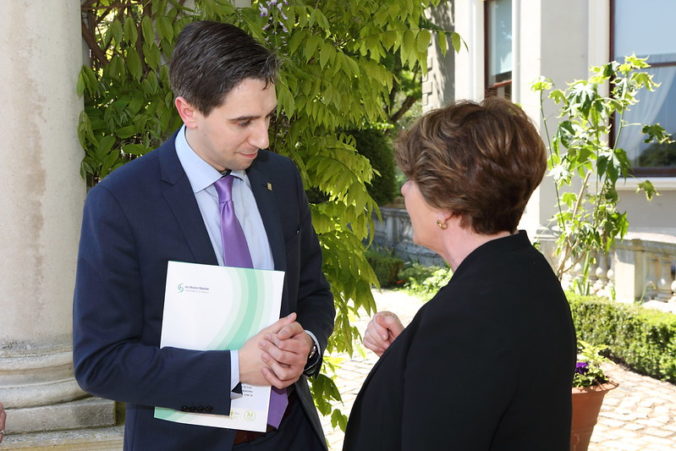domenica, gennaio 26, 2020
mercoledì, gennaio 22, 2020
Time for Irish pharmacists to be given proper conscience rights

A landmark rule has recognised the right for German pharmacists to refuse to sell the so-called morning after pill (MAP) on grounds of conscience. No such right has ever been recognised in Ireland. The drug is used as a post-coital contraceptive but, when conception occurs, it also prevents implantation in the uterine wall, causing the death of the embryo.
The German case occurred when a pharmacist who based in Berlin refused to stock or sell the drug was and reported to the Pharmacists’ Chamber. He then took the matter to the Professional Court of the Administrative Court of Berlin, which ruled in his favour, but the case could continue if the Chamber appeals.
It was the first time that a court addressed the matter in Germany. Other European countries, Italy or Spain for instance, have recognised such a right through court ruling or legislation.
“Personal beliefs and conscience influence all areas of a person’s life and are not simply laid down in a professional setting. This pharmacist in Berlin faced legal proceedings for choosing to act in line with his conscience. The court recognized that he did not violate the law and should not be forced to act against his personal convictions,” said Felix Böllmann, Legal Counsel for Alliance Defending Freedom International, which is the advocacy organization that has supported the pharmacist in this case.
Provision for conscientious clauses are more common for other health professionals but pharmacists often find their rights not protected.
This is the case in Ireland where no law or code explicitly recognises conscientious objection rights for pharmacists.
The morning after pill is not classified as an abortifacient under Irish law, even if it has the possible effect of killing a newly formed human being.
When in 2011 the Irish Medicines Board approved the sale of a new MAP over the counter without the need for a prescription, the Pharmaceutical Society of Ireland (PSI) confirmed that pharmacists must stock the drug or “take reasonable action to ensure that these medicines or services are provided”.
In the recently updated Code of Conduct of the Pharmaceutical Society of Ireland (PSI) there is no reference to freedom of conscience, religion or belief.
Conscientious objection is not provided explicitly, and it is mentioned only once, simply in order to emphasis the limits of its scope. Addressing the pharmacist, the Code says: “[You] must refer patients to an alternative provider if you cannot provide a professional service or medicinal product, including in the case of conscientious objection, ensuring that patient care is not jeopardised or compromised” (p. 9)
In theory, one way for a pharmacist to avoid the direct selling of the drug is through an expedient. They could simply not stock the drug in their premises and therefore circumvent the obligation to sell. But as the Code still oblige them to refer patients to an alternative provider, they are practically forced to act against their conscience anyway and to participate to a course of action that potentially kills a human being. Moreover, this limited expedient is not available to those who work in a pharmacy where they have no control on what is sold.
A pharmacist could also take a constitutional case and see if the Irish courts would recognise their rights that way but as of now, pharmacists have no explicitly recognised right to refuse to sell drugs like the morning after pill.
This is astonishing and it was noted in a report produced by the Observatory on Intolerance and Discrimination Against Christians in Europe. “The Irish constitution has strong religious freedom protections, but if a pharmacist is unwilling to sell the morning after pill he would have to take his employer to court and plead for his constitutional rights. This could be very expensive and therefore most pharmacists with an objection to abortifacients in practice either sell them or quit their job.”
There is no explicit protection for pharmacists in the 2019 abortion legislation and, similarly, it is possible that if euthanasia and assisted suicide are introduced in Ireland, pharmacists will be coerced to provide lethal drugs.
The new Code of Conduct of the PSI never mentions conscience, as if it has no part in the profession. On the contrary, the aspiration to prevent diseases, to heal, and to take care is a deeply ethical element in the job of pharmacists. Denying conscience and its rights represents a fundamental disavowal of the moral dimension that leads their work.
lunedì, gennaio 20, 2020
Avanti ragazzi di Buda, avanti ragazzi di Pest
Avanti ragazzi di Buda
avanti ragazzi di Pest
studenti, braccianti, operai,
il sole non sorge più ad Est.
Abbiamo vegliato una notte
la notte dei cento e più mesi
sognando quei giorni d'ottobre,
quest'alba dei giovan'ungheresi.
Ricordo che avevi un moschetto
su portalo in piazza, ti aspetto,
nascosta tra i libri di scuola
anch'io porterò una pistola.
Sei giorni e sei notti di gloria
durò questa nostra vittoria
ma al settimo sono arrivati
i russi con i carri armati.
I carri ci schiaccian le ossa,
nessuno ci viene in aiuto
il mondo è rimasto a guardare
sull'orlo della fossa seduto.
Ragazza non dirlo a mia madre
non dirle che muoio stasera
ma dille che sto su in montagna
e che tornerò a primavera
Compagni noi siam condannati,
sconfitta è la rivoluzione
fra poco saremo bendati
e messi davanti al plotone
Compagno il plotone già avanza,
già cadono il primo e il secondo
finita è la nostra vacanza,
sepolto l'onore del mondo
Compagno riponi il fucile
torneranno a cantare le fonti
quel giorno serrate le file
e noi torneremo dai monti
Avanti ragazzi di Buda,
avanti ragazzi di Pest
studenti, braccianti e operai,
il sole non sorge più all'Est.
mercoledì, gennaio 15, 2020
lunedì, gennaio 13, 2020
venerdì, gennaio 10, 2020
giovedì, gennaio 09, 2020
mercoledì, gennaio 08, 2020
Letture del 2019
Per ragioni professionali leggo molto, in particolare materiale online. Questi sono i volumi che nel 2019 ho letto interamente:
Jennifer Lahl, Broken Bonds: Surrogate Mothers Speak Out
Alfred O'Rahilly, Religion and Science
Patrick Deneen, Why Liberalism Failed
Sophie Lewis, Full Surrogacy Now: feminism against family
Michael Brendan Dogherty, My Father Left Me Ireland: An American's Son Search for Home
Robert J Barro, The Wealth of Religions: The Political Economy of Believing and Belonging
Nadine Strossen, HATE: Why We Should Resist it With Free Speech, Not Censorship
Gerard Casey, ZAP: Free Speech and Tolerance in the Light of the Zero Agression Principle
Peter Boylan, In the Shadow of the Eigth: My Forty Years Working for Women's Health in Ireland
Jennifer Lahl, Broken Bonds: Surrogate Mothers Speak Out
Alfred O'Rahilly, Religion and Science
Patrick Deneen, Why Liberalism Failed
Sophie Lewis, Full Surrogacy Now: feminism against family
Michael Brendan Dogherty, My Father Left Me Ireland: An American's Son Search for Home
Robert J Barro, The Wealth of Religions: The Political Economy of Believing and Belonging
Nadine Strossen, HATE: Why We Should Resist it With Free Speech, Not Censorship
Gerard Casey, ZAP: Free Speech and Tolerance in the Light of the Zero Agression Principle
Peter Boylan, In the Shadow of the Eigth: My Forty Years Working for Women's Health in Ireland
lunedì, gennaio 06, 2020
EPIFANIA, È IL NATALE DEL CUORE
Quando eravamo bambini ci hanno insegnato che i Magi erano dei Re, erano tre, si occupavano di astronomia e si chiamavano Gaspare, Melchiorre e Baldassarre.
In realtà se si legge l’unica fonte attendibile, quella del Vangelo di Matteo al capitolo 2, si scopre che le cose non stanno proprio come la tradizione orale ce le spiega.
Ma la storia dei Magi continua a colpire la pietà popolare. Sono diventati “re”, perché ne parlano sia il libro del profeta Isaia 60,3 e sia il Salmo 72. Sono tre perchè nella Bibbia è un numero perfetto – con Sem, Cam e Jafet, i figli di Noè, ricomincia una nuova umanità – oppure perché i doni che offrirono erano appunto tre.
Di sicuro possiamo dire che le loro reliquie si trovano a Colonia in Germania, rubate dal Barbarossa nel 1164 alla chiesa di S. Eustorgio prima di distruggere Milano.
I loro nomi divennero Gaspare, Melchiorre e Baldassarre, che in certe regioni, all’inizio dell’anno nuovo, si scrivono sulle porte a protezione di uomini e bestie. In diverse culture, come ad esempio in Spagna, i regali si scambiano nel giorno dell’Epifania e non a Natale come in Italia
I loro nomi divennero Gaspare, Melchiorre e Baldassarre, che in certe regioni, all’inizio dell’anno nuovo, si scrivono sulle porte a protezione di uomini e bestie. In diverse culture, come ad esempio in Spagna, i regali si scambiano nel giorno dell’Epifania e non a Natale come in Italia
Potrebbero essere stati degli arabi o più realisticamente dei diplomatici persiani o babilonesi che avevano sentito parlare dagli ebrei esiliati del grande segno (la nascita di un Re!).
Allora il viaggio di questi ambasciatori in ricerca inizia per rendere omaggio e onorare il Popolo a cui era nato un nuovo Re. Partono con questa luce (interiore) che li guidava. Poi, come spesso capita anche ai sapienti, improvvisamente questa stella la perdono e si trovano davanti a Erode. Gli chiedono: “Dove è il re dei giudei, che fu partorito?”.
Allora il viaggio di questi ambasciatori in ricerca inizia per rendere omaggio e onorare il Popolo a cui era nato un nuovo Re. Partono con questa luce (interiore) che li guidava. Poi, come spesso capita anche ai sapienti, improvvisamente questa stella la perdono e si trovano davanti a Erode. Gli chiedono: “Dove è il re dei giudei, che fu partorito?”.
Davanti a lui capiscono che deve essere successo qualcosa di grande perché nello stesso territorio governavano due Re, Erode e un altro tipo di re ancora tutto da scoprire ma che il cuore desidera conoscere perché ce lo chiede…
Il brano di Matteo sprigiona un cammino straordinario di ricerca, è dunque un percorso per incontrare il Signore. Essendo già nato, si tratta di scoprire “dove” lo si può trovare.
A livello spirituale nel racconto del Vangelo di Matteo si presenta “il natale dell’anima” (Meister Eckhart): la nascita del credente in Dio e di Dio nel credente. È una generazione graduale, che il gesuita, p. Fausti spiega in cinque tappe:
1. Siamo chiamati a con-siderare (stare-con-le-stelle) dell’intelligenza
che apre a de-siderare e seguire la propria stella:
2. la Scrittura che svela colui che desideriamo;
3. la gioia del cuore che mostra dove lui è;
4. l’ad-orazione (portare alla bocca colui che si ama per baciarlo);
5. e infine il dono di sé a colui che già si è donato a noi.
che apre a de-siderare e seguire la propria stella:
2. la Scrittura che svela colui che desideriamo;
3. la gioia del cuore che mostra dove lui è;
4. l’ad-orazione (portare alla bocca colui che si ama per baciarlo);
5. e infine il dono di sé a colui che già si è donato a noi.
Dobbiamo fare in prima persona l’itinerario dei Magi, con la fatica di un cammino notturno pieno di fascino e di paure, di desideri e di dubbi, di speranze e di incertezze, sotto la guida di una mobile stella che appare e scompare. Diversamente siamo come Erode, che vuole ucciderlo, o come gli scribi e i sacerdoti il cui sapere serve a dare indicazioni a chi lo uccide.
Invece come scriveva S. Agostino: “L’anima è più presente dove ama che nel corpo che anima”.
È la forza che permette a questi uomini di prostrarsi e adorare un bambino. Si arresta il cammino esteriore; con l’adorazione comincia quello interiore. Tre volte si dice “adorare” (versetti 2.8-11).
È la forza che permette a questi uomini di prostrarsi e adorare un bambino. Si arresta il cammino esteriore; con l’adorazione comincia quello interiore. Tre volte si dice “adorare” (versetti 2.8-11).
Poi aprono i tesori. Nel Vangelo di Matteo il tesoro coincide con il cuore dell’uomo:“dove è il tuo tesoro, lì è il tuo cuore”.
Apprendo il loro cuore offrono ciò che contiene:
– L’oro per onorare la sua regalità, ricchezza visibile, rappresenta ciò che uno ha.
– L’incenso, per riconoscere la sua divinità, invisibile come Dio, sale in Cielo e rappresenta ciò che uno desidera.
– La mirra, per accarezzare la sua umanità e la sua mortalità, era l’unguento che curava le ferite e preserva i defunti dalla corruzione della morte.
Apprendo il loro cuore offrono ciò che contiene:
– L’oro per onorare la sua regalità, ricchezza visibile, rappresenta ciò che uno ha.
– L’incenso, per riconoscere la sua divinità, invisibile come Dio, sale in Cielo e rappresenta ciò che uno desidera.
– La mirra, per accarezzare la sua umanità e la sua mortalità, era l’unguento che curava le ferite e preserva i defunti dalla corruzione della morte.
Tornano dov’erano partiti. Ma “per altra via”: non più quella di chi cerca uno che non conosce, ma quella di chi ha trovato colui che cerca. Infatti non sono più quelli di prima; hanno trovato “dove” è nato il re. Il “dove” di Dio è il cuore dell’uomo, e il “dove” dell’uomo è il cuore di Dio.
Ecco l’epifania cosa è: la manifestazione di Dio nella vita dell’uomo. Nella mia, ma anche nella tua.
Ecco l’epifania cosa è: la manifestazione di Dio nella vita dell’uomo. Nella mia, ma anche nella tua.
Per il mondo greco tutto questo era un’assurdità. Platone nel Simposio aveva scritto che “Il divino non può essere mescolato da ciò che è umano”. Ma tutto questo rimane un problema ancora per molti.
Mentre per la Scrittura è divino proprio perché quel bambino è umano. Non a caso il bambino viene deposto in una mangiatoia perché lo si possa “mangiare” (metaforicamente), ci si possa nutrire di lui e soprattutto ascoltarlo.
Noi, infatti diventiamo “le parole che ascoltiamo” e questo spiega chi parla tanto senza dire niente… non si nutre da nessuna parola di vita, altri invece hanno parole cariche di significato e di vita perché frutto di un ascolto che scolpisce mente e cuore.
L’epifania è una scelta dura e ardua, spesso lontana dalle logiche della nostra cultura. Ma la promessa della Scrittura è di quanto più bello e profondo si può ricevere in dono: “A quanti lo hanno ricevuto ha dato il potere di diventare figli di Dio”.
Epifania è anche il Natale del cuore, “all’amore fra noi, Dio non si aggiunge: vi si manifesta” (Maurice Bellet).
venerdì, gennaio 03, 2020
Minister Harris attacks a Catholic parish for being Catholic

Minister for Health Simon Harris has attacked a parish in Tullamore for a stating that IVF is incompatible with the Catholic faith. In doing so, he has stepped far outside his role as a Government Minister. He needs to mind his own business, which is precisely what some people have been telling the Church to do for years.
On Christmas Eve the following post appeared on the Tullamore Parish Facebook page: “Let’s continue to pray for life. We pray for couples struggling to naturally conceive and who are avoiding IVF treatment. The process of IVF damages embryonic stem cells and thus life and therefore is completely, clearly and totally incompatible with our Catholic faith. For all believers in God, all life is sacred at all times. …” The post has since been removed, following criticism on the page and on other media. The parish has also apologised.
Minister Harris, who recently announced a €2 million plan in support of the IVF industry, said: “The comments were, I am sure unintentionally, extremely hurtful to many families who are struggling with fertility issues”. He continued: “I thought and certainly hoped we had moved to a point as a country that this sort of inappropriate interference in decisions that individuals and couples make about their own lives would be left to them”.
How can such a post on Facebook be considered “inappropriate interference in decisions”?
It was a call for prayers and a reminder of what the Catholic Church teaches.
Artificial reproduction raises a large number of ethical issues. For instance, the number of embryos which are created but not used, or the selection and destruction of “defective” embryos.
It is not interference but, rather, part of the ordinary duty of a parish to stand beside those who struggle to conceive and, at the same time,to remind them about the moral principles that should guide every decision.
That Facebook post was not even a comment on legislation or on Minister Harris’s policies. It wasn’t an attempt to shape or to change the law, which would be perfectly legitimate in a democracy. It was simply written by someone in charge of the parish’s page to explain, very briefly, what the Church believes.
Minister Harris’s comments, instead, are an inappropriate interference in the right and duty of a parish to inform its parishioners about the teachings of the Catholic Church they belong.
It is not the role of a Minister to lecture faithfuls on their beliefs. After condemning a Facebook post, is he going to censor the parish bulletins all around the country?
Separation between Church and State means that the State’s representatives respect all moral and religious principles sincerely held by the citizens and do not interfere with their expression.
Moreover, when was the last time that Minister Harris attacked the views of a religion other than Catholicism? Catholics should expect from him, and from anyone who represents the State, the same sensitivity shown for other faiths.
But we know that the Catholic faith is a soft target and, particularly with the general election coming soon, it’s useful to take pot shots at it in order to divert the public from the real problems that a Minister for Health should deal with.
giovedì, gennaio 02, 2020
Iscriviti a:
Commenti (Atom)




